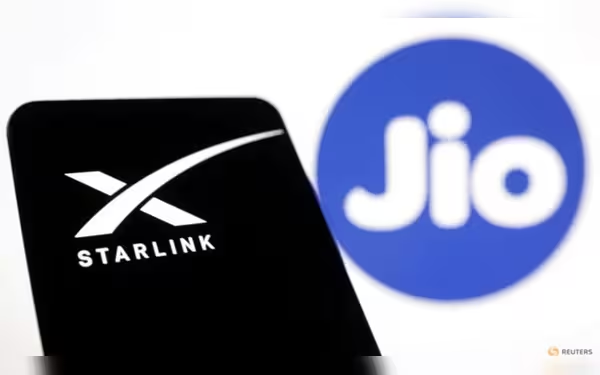Saturday, November 16, 2024 07:29 PM
Reliance Urges Review of Starlink and Amazon's Satellite Services in India
- Reliance requests review of Starlink and Kuiper's market impact.
- Concerns rise over foreign competition in satellite internet.
- Regulator to evaluate feedback before final recommendations.
 Image Credits: channelnewsasia
Image Credits: channelnewsasiaReliance requests India's telecom regulator to reassess the impact of Starlink and Amazon's satellite services amid rising competition concerns.
In a significant move that could reshape the landscape of satellite internet services in India, billionaire Mukesh Ambani's Reliance has formally requested the country's telecom regulator to reassess the potential reach of Elon Musk's Starlink and Amazon's Kuiper. This request comes amid rising concerns that local players like Reliance could face challenges if foreign competitors are allowed to operate without stringent regulations. The letter, which has not been made public, highlights the ongoing tension between Reliance and Musk regarding how India should allocate satellite spectrum.
Reliance has been a dominant player in the Indian telecom market, investing approximately $23 billion in spectrum auctions over the years. The company claims to handle around 15 billion gigabytes of data each month. However, with Starlink's ambitious plans to target the same customer base, offering a potential capacity of nearly 18 billion gigabytes of data through its satellite network, the stakes are high. Experts suggest that the auction process typically requires higher initial investments, which could deter foreign players, thereby favoring Reliance.
In the letter dated November 15, Reliance urged the telecom authority to critically evaluate the capacities created by these large satellite constellations, such as Starlink and Kuiper. This plea reflects a broader concern that the entry of these foreign entities could disrupt the existing market dynamics, potentially leading to a loss of customers for local providers.
A senior official from the telecom regulator indicated that all feedback, including Reliance's concerns, would be thoroughly reviewed before final recommendations are made, likely by the end of the year. Meanwhile, Starlink is actively seeking security clearance to offer its satellite broadband services in India, with the telecom minister stating that a permit will be granted if all conditions are met.
Interestingly, both Ambani and Musk have employed aggressive strategies to capture market share. Ambani previously offered free data on his mobile plans, while Musk has introduced Starlink in Kenya at a significantly lower price of $10 per month, compared to $120 in the United States. This pricing strategy has raised alarms among local telecom operators in those regions.
As the competition heats up, it is essential for regulators to strike a balance between fostering innovation and protecting local businesses. The outcome of this face-off between Reliance and Musk could set a precedent for how satellite services are managed in India, potentially influencing the future of internet accessibility for millions of users. With the rapid advancements in technology and the increasing demand for reliable internet services, the decisions made in the coming months will be crucial for the telecom landscape in India.













